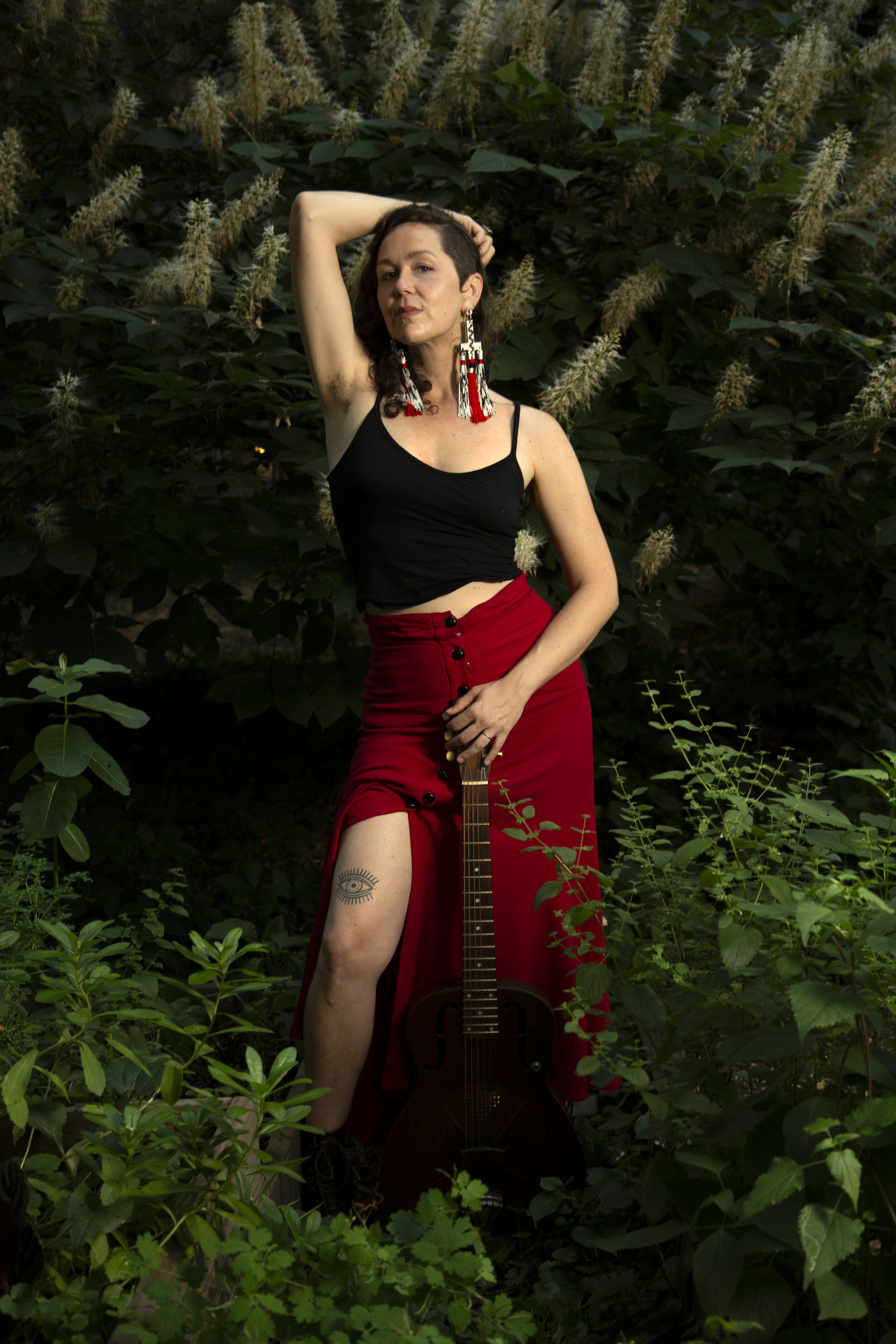Mamie Minch is a longtime staple of New York City’s blues scene. Listening to her sing and play is like unpacking a time capsule of American music that’s been stored in her 1930’s National steel guitar for decades and filtered through a modern femme sensitivity.
Photo: Tamara Staples
Mamie’s honest, deep singing voice and old school guitar walloping become a vessel for her toughness and pathos as she delivers timeless performances that can rile, groove, sooth, and understand. If you’ve been lucky enough to see Mamie perform in New York City or somewhere else in the wide world, then you know: there are some things a person is simply meant to do.
These days, you can catch Mamie in her duo with Dean Sharenow (Kill Henry Sugar, Joan Baez) at their residency at Barbes, Brooklyn’s best small club, or solo at Jalopy, NYC’s mainstay of Americana music. She also tours Europe with her all-woman band redecorating the songs of Tom Waits, VKB Band, along with bandmates Rachelle Garniez and Amanda Homi. Mamie began playing guitar as a teenager in her bedroom listening to reissues of class country blues on repeate. Her job at a local record store gave her first dibs on releases from labels like Yazoo and Document. She would hurry home and try her hand at picking out the songs of legends like Mississippi John Hurt, Lightnin’ Hopkins, Memphis Minnie and Bessie Smith. She loved the steady thumb and percussive right hand of these blues players, but she also devoured lots of different styles of music, from soul to psychobilly and old time to punk rock.
After graduating from art school in non-traditional printmaking techniques, Mamie came to New York City where she fell in with a crowd of 78 record collectors, some of whom had contributed rare recordings to the same reissue labels she loved. It was a mind-expanding time for her and she connected with a crowd who were interested in early American music. Soon, she was playing around the city in small clubs with her first band, Delta Dreambox. She met Meg Reichardt (Les Chauds Lapins, Low Down Payment), another guitarist and singer who could sound like she’d jumped off of an Edison wax cylinder, and they founded the four-piece, all-woman harmony group the Roulette Sisters, who played together for a decade and recorded two full-length albums.
In 2008, Mamie released her first solo album, Razorburn Blues, in collaboration with bassist/engineer Andy Cotton. Through the community of musicians centered around Barbes, Mamie connected with beloved singer/guitarist Dayna Kurtz. They toured together as a duo—two altos performing show-stopping, full-bodied harmony over layers of guitar—and made a 10” record, “For the Love of Hazel.”
After a tour through Australia opening for CW Stoneking, Mamie wanted to put together something more driving, and started working with drummer Dean Sharenow. Dean’s steady-handed rhythm and backup vocals are supportive in just the right way, letting Mamie’s more traditional influences turn up, stretch out, and get deeper, groovier, funkier. This duo with Dean remains Mamie’s main, current project. Their sets are one part hill country blues dance and one part harmony crooners with a dash of bittersweet feminist folk sentiment.
Collaboration has been a theme throughout Mamie’s creative career and several other pairings have proven sustaining over the last decade. She has a long-running duo with Tamar Korn, the wonderful, whimsical singer of early jazz and American Songbook. Together, the two blend intense, sister harmonies over Mamie’s guitar lines; in 2019, they released a self-titled 7” record on Jalopy Records. Mamie is also one third of a project called Filmic Music in which she and Steve Ulrich, Big Lazy’s frontman, write and perform live original scores for silent films created from found footage by Russell Scholl, the archivist and media collector. Most recently, Mamie is singing with Julia Patinella, the Brooklyn-based flamenco singer, covering Latin divas of old such as Celia Cruz, Chavela Vargas, and Mercedes Sosa.
For her latest solo release, 2020’s EP Slow Burn, Mamie collaborated with Dean Sharenow, who was both drummer and engineer/producer. They made the record at Reservoir Sound, one of the last big studios in NYCs historic Midtown recording district. The collection of songs—all original but one—had been on slow simmer over the years she’d been performing with Dean, gaining nuance and depth along the way.
Slow Burn tells stories that carry the listener through time and space with songs like “Big Bad Maddie,” a modern response to R.L. Burnside’s “Poor Black Maddie” that has the driving groove of an old-school blues dance song; our Big Bad Maddie is not to be trifled with. “True Blue” is a folk song about Yves Klein blue, as idiosyncratic and beautiful as any field recording. Mamie sings about women who cut their own paths but still have space for the tenderest feelings. The texture of the album springs from the interplay between Mamie and Dean’s instruments and voices, highlighting how much is possible in a duo relationship. Joining for cameos are Erik Della Penna on slide guitar, CJ Camerieri on french horn, and Logan Coale on the upright bass.
When she’s not making music, Mamie spends her days as a guitar repair luthier at Brooklyn Lutherie, the shop she and her business partner, Chloe Swantner, opened in 2014. It remains one of the few women-owned and -operated shops around. She also teaches, writes articles about luthiery and guitar playing for She Shreds and Acoustic Guitar magazines, and runs the annual Ukulele Building Camp for Girls in Brooklyn, NY.
